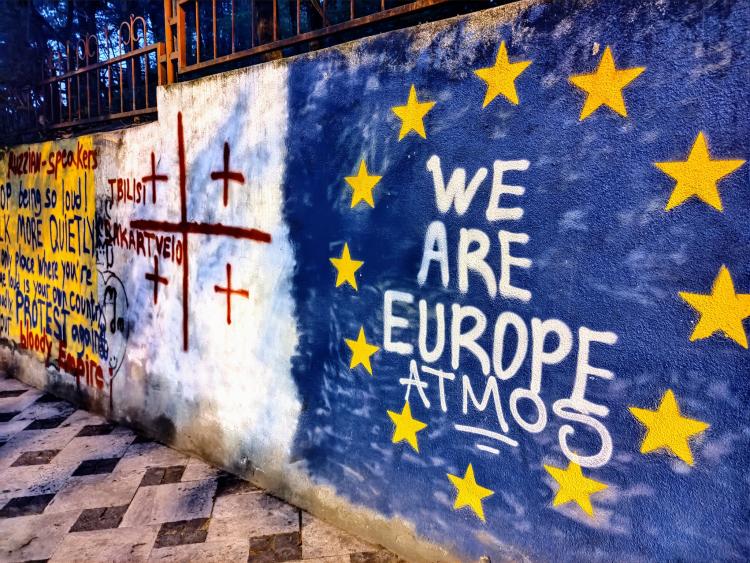
During a tense plenary session marked by brawls among lawmakers, the ruling Georgian Dream majority passed the law, while a large group of protesters gathered outside the Parliament building.
Crackdown on protests and passage of controversial law “On Transparency of Foreign Influence”
Following the large rally on May 11, where over 100,000 people gathered at Tbilisi’s Europe Square, protesters returned on May 12 for an overnight sit-in at Rustaveli Avenue near the Parliament building. Early on May 13, the police dispersed the peaceful demonstrators, clearing the entrances to the Parliament. About twenty protesters were arrested, with some being severely beaten by the police.
On May 13, the Public Defender issued a statement saying that “in the facts of attacks on representatives of opposition parties, journalists and participants of the rally there are signs of persecution of people based on political [views], activity and opinion, which categorically contradicts the individual rights of people guaranteed by the Constitution and international acts, as well as the basic principles of a democratic society and rule of law.”
On the morning of May 13, amidst overnight protests, the Parliament's Legal Affairs Committee swiftly voted in favour of adopting the bill in its third and final hearing. The vote took less than a minute, with no deliberations. Many opposition MPs were held up outside the Parliament by police.
On May 14 the ruling party adopted the controversial law in its third and final reading by 84 votes against 30.
Following this, the parliamentary opposition parties, namely the United National Movement, Strategy Builder, Lelo Party and independent MPs, declared a parliamentary boycott. The MPs emphasised that it's untenable to carry on parliamentary duties under the current circumstances.
International concerns and support for Georgian protesters
On May 13, during his visit to Georgia, the chairman of the Foreign Affairs Committee of the German Bundestag, Mikhail Roth, expressed his views on the country's European integration, stating that he "could not envision a promising future for Georgia unless the government retracted this law."
On the same day, just before the Georgian Parliament voted on the controversial law, 55 international human rights organisations and civil society groups issued a joint statement. They urged European and national leaders to act quickly against the Georgian Dream government's crackdown on civil society before the October Parliamentary elections.
Today, international support is evident as several high-ranking officials addressed the ongoing situation. UN in Georgia expressed regret over the passing of the law, warning that it endangers freedoms of expression and association and could hinder the crucial roles of civil society and media in Georgian democracy.
What to expect next?
Currently, in accordance with the procedure, the Georgian Parliament is allotted a 10-day period following the adoption of a draft law to transmit it to the President of Georgia for ratification. Subsequently, the President possesses a two-week interval subsequent to the adoption of the draft law to either endorse or veto it. Upon its return with the President's comments, the law is deliberated during a plenary session of the Parliament and subsequently adopted in a single reading.
The law is a significant step back for Georgian people, endangering their freedom of association, as well as their European ambitions. It is identical to the 2023 version, creating a register of ‘agents of foreign influence’ to include CSOs who receive at least 20% of their annual revenue from sources from abroad. For more information, see the in-depth analysis of the original draft law.
Photo by Jelger Groeneveld from https://www.flickr.com/photos/saab99/53684060923
